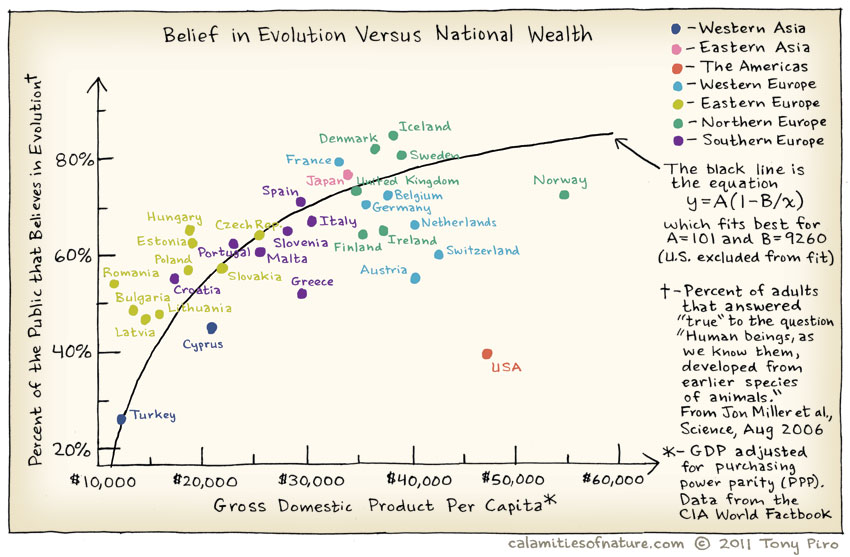It’s amazing the interesting things that can be done with survey data. This chart reposted at the I Love Charts tumblr (from a site called upworthy) is fascinating.
I wonder where South Korea would be on this chart – I have a sort of suspicion it would be an outlier much like the US, and for similar cultural reasons – i.e. the prevalence of evangelical strains of Christianism.
I also would be curious to see the same chart with each US state separated out and treated as separate countries with their individual state-level survey results and varying individual state-GDP figures. Would there still be outliers? Or would you find each individual state cleaving closer to the curious curve that was discovered?


It’s not clear what the cause is and what the effect is here. So the richest countries tend to more-highly express agreement with a dominant tenet of the Western social apparatus (if that makes sense) — Is it a surprise that those doing best within a system are most willing to express agreement with that system’s central tenets?
In other words (the way I see it), if the “dominant Western social apparatus” were, for some reason, to turn against Evolution, maybe you’d see the inverse relationship above. It’s not about whether Evolution is “true” (obviously it is), it’s about what Society tells us we should declare to be true.
The USA as an outlier may be explained by the fact that several different subnations exist within the USA, some of which necessarily base their identities, in part, around rejecting/distancing-themselves from this “dominant social apparatus”. I’m thinking especially of White-Southerners who vaguely associate Evolution with a Yankee conspiracy or something. (When they talk about “Red-State vs. Blue-State” stuff, this kind of thing is probably what people mean — some subnations of the USA [Red] vs. other subnations of the USA [Blue]).
Or, maybe religious belief really does, after all, correlate with lower ability to create and maintain wealth. The big weakness with this idea seems to be that the ancestors of all these ‘atheist’ Europeans were quite religious not long ago and they did quite well at creating/maintaining wealth, even then.
I completely agree that there is no indication of cause and effect – I didn’t point that out in my observations but your thoughts are in line with my own. One reason I would be curious to see South Korea (and other wealthy Asian countries, not just Japan) is because it might provide some clues on that front.
My comment about wanting to see the data by US state is in line with what you said about subnations.
Lastly, I actually would disagree with the idea that there is causal relationship between wealth and belief, based on my own instincts. I think evangelical Christianity has been a net positive in South Korea’s emerging wealth, and I ran across an interesting statistic that pointed out that Ghana, one of the rare “rising tigers” in otherwise bleak Africa, has a very high pentecostal contingent, too.